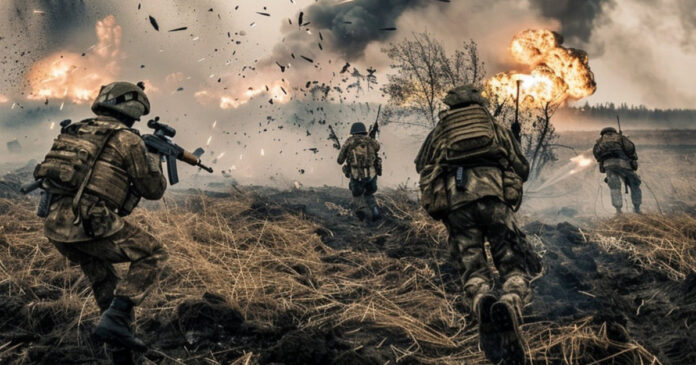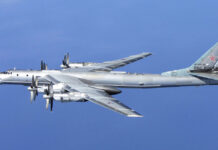After draining Ukraine of the resource it can least afford—namely young men capable of fighting—Russia appears to be doubling down on its war in Ukraine. During the night, an increasing number of drones and missiles plunge into Ukraine, often striking parts of Ukraine’s energy grid and recently striking a storage depot believed to have held more than 50 Storm Shadow missiles. On the ground, Russia is making some gains in its westward push in the Donetsk region and now into Dnipropetrovsk. It is slow progress, but it is still progress, and Ukraine may lack the manpower to effectively stop it.
But Russia is not alone in stepping up its attacks. Ukraine has also increased the frequency and depth of its attacks, using both air power and sabotage to hit the fuel dumps and ammo storage depots, train lines and bridges, chemical plants and refineries, and Russian air assets. Ukraine’s strikes are landing deeper inside Russia, striking Moscow and military targets hundreds of kilometers inland. It appears Ukraine’s European suppliers were not kidding when they said Ukraine was no longer limited to short-range strikes.
Beyond hoping to slow the Russian advance, Ukraine’s targets selection appears to be aimed at creating a loss of face for Russia and Putin, perhaps hoping to create a political situation that will move them towards peace.
Drones
In the three years since the war started, drones have become a major weapon system, and the technology has advanced rapidly. A couple of years ago, videos of consumer drones enhanced to drop dropping grenades on Russian soldiers reflected the height of technology. Today, drones can loiter in place, waiting for a target. Many are designed to be the bomb, not just deliver it. Because jamming can disrupt drones, they are incorporating artificial intelligence, which lets drones fly themselves without being connected to an operator. Others trail a thin fiber optic cable behind them, providing a data pathway that cannot be hacked or jammed.
Ukraine has also had success with its seagoing drones which can not only act as remote controlled explosive-delivery devices, but have mounted anti-aircraft missiles and shot down at least one Russian Su-30 fighter jet. One can envision a day where stealth submarines or low-profile boats navigate into a port or up a river and launch suicide drones on nearby targets.
At the start of the war, Ukraine purchased Bayraktar TB2drones from Turkey while Russia was buying drones from Iran. Ukraine has since developed massive drone production capabilities and is reportedly producing thousands per month. Russia appears to be focused more on ground capabilities, which may mean it is still fighting the last war.
Ukraine has also successfully deployed sabotage to destroy key infrastructure in Russia. It has also had moderate success in using assassination. The question is, why haven’t Russia and its security services done the same? When you come right down to it, why has Russia allowed Zelensky to live?
Proxy War
In the past, proxy wars have involved two proxies, one on each side. This time, a major power invaded a country that quickly became a proxy. (You think Russia would have learned not do to do this after its problems in Afghanistan. They would have been better off having Belarus invade Ukraine.) This was a miscalculation or Russia’s part. They are losing men and equipment fighting a country backed by a dozen others. Every time an American Javelin system destroys a Russian tank, Russian tankers are killed. Every time a Ukrainian soldier is killed, a building bombed, or an electrical substation is destroyed, most Americans are not even aware of it.
Meanwhile, Russia is using up its munitions, spending its anti-aircraft missiles, seeing its long-range radar installations destroyed, and losing fighter jets and strategic bombers. Its economy has taken a hit, there are more internal critics than ever before, and Russians with telephones keep posting explosions and plumes of smoke on social media, showing Ukrainian targetters just how successful their strikes have been.
The moral of the story is: never be the proxy.
The danger of this war is that Russia might reach a breaking point and attack NATO countries, either with conventional or nuclear weapons. They could also attack Ukraine with a tactical nuke, perhaps smuggling in a suitcase nuke from Belarus and then proclaiming their innocence afterwards. Such a ruse might prevent a U.S. or NATO counter attack while cutting off the head of the Ukrainian military and political leadership sufficiently to end the war.
Worse-Case Scenarios
It is also possible Russia will strike NATO countries, including Poland, which is the gateway through which so much foreign military aid passes. They could also strike Germany or even the UK as a warning. Given the force of the NATO/U.S. response, I don’t expect they will do this unless, as some have suggested, Russia has been holding back its best weapons for when it has to fight NATO. They may have kept some S-400 and S-500 missiles in reserve, but there is no secret stash of high-tech weapon systems waiting to be rushed to the front line. Russia barely managed to invade Ukraine. I don’t see them successfully invading Poland or Finland.
Another theory is that when Russia realizes it cannot win a conventional war, it will launch a nuclear first strike on the U.S. and Europe. The theory states that if Russia is going to be destroyed, they will launch a nuclear attack to bring the rest of the world down with them. But the fallacy of this approach is Russia isn’t going to be destroyed. Ukraine may have excellent drone technology and stealthy saboteurs, but they lack the ability to conquer Russia. If Ukraine and Russia were to declare a ceased fire tomorrow and negotiate a peace agreement in a few weeks, Russia would have captured enough land to be considered the winner, especially after their internet bots and propaganda campaign drives the message home to their populace.
Meanwhile…
Here in the United States, no one is worried about the war in Ukraine. People in California, for example, are too busy fighting to protect illegal alien criminals. Democrats who backed Ukraine under Biden are too busy fighting Trump to worry about combatting Putin. Consumers are too busy trying to get a job or pay their bills to focus on a war an ocean away. They are worried about tariffs or AI, not Russians.
Since the war started, there have been hurricanes, floods, snowstorms, earthquakes, volcanos, wildfires, tornadoes, and many other disasters. Most American preppers are no longer prepping for war in Europe.
I’m still prepped for it because I am not prepping for a single event; I am prepping for any event. We don’t have a bunker or a bomb shelter, but I still believe some people will survive a nuclear war. I want to be prepared if I happen to be one of them.
I’m continuing to prep. Maybe we face an economic collapse, or a war in Iran. Maybe China will invade Taiwan. Perhaps North Korea will launch nuclear missiles. Maybe the next coronal mass ejection from the sun will wipe out the electrical grid. Or, we could just get more hurricanes, tornadoes, and earthquakes. I want to be as prepared as possible for whatever the future holds, while still having fun and living my life. I encourage you to do the same.







